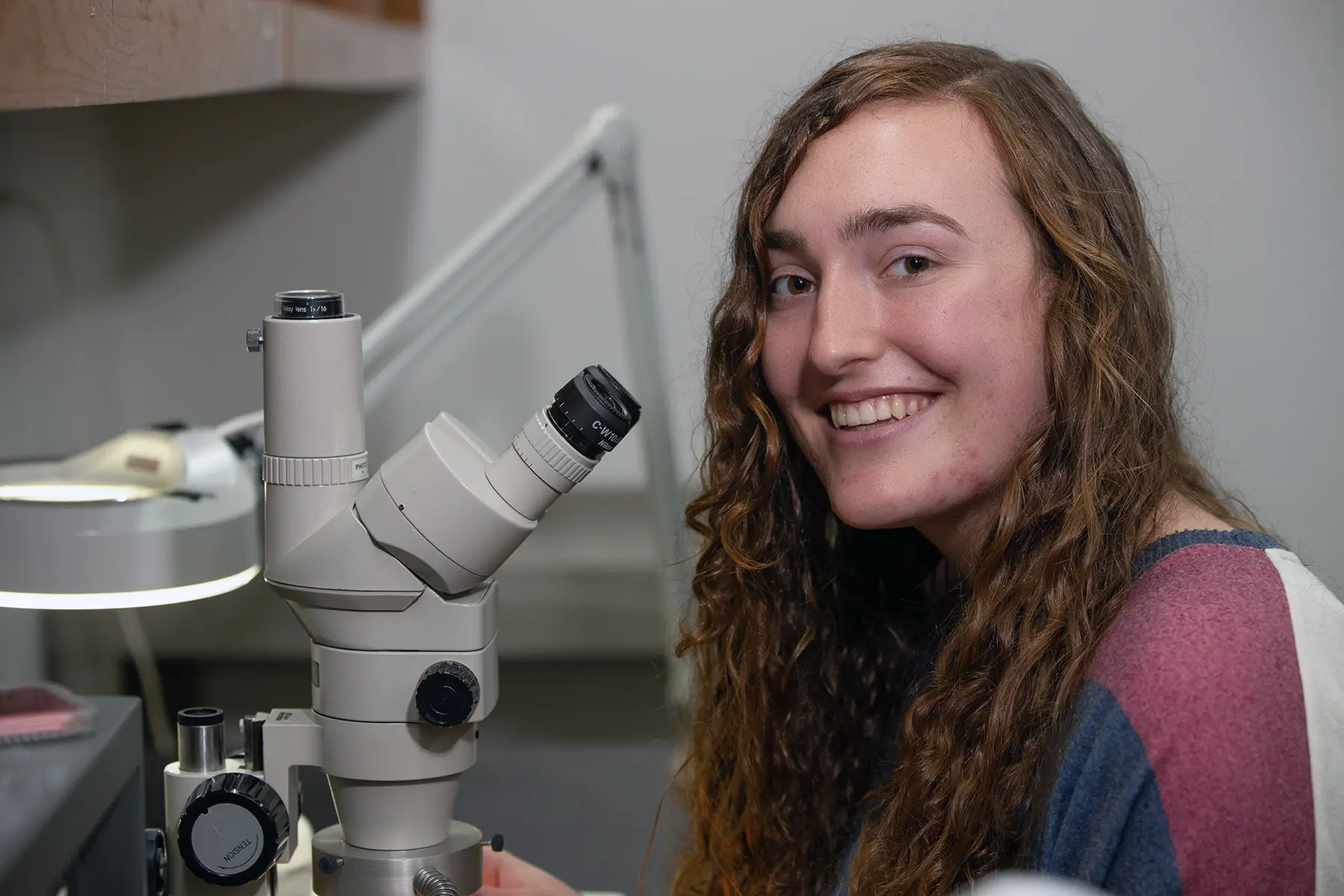Environmental Protection Agency participant assists Great Lakes restoration on research vessel
Meet Isabel Dunn

Isabel Dunn is an ORISE participant in the Great Lakes National Program Office (GLNPO), where she conducts Great Lakes field research and assists with maintaining a database that tracks Great Lakes restoration and protection efforts. (Photo Credit: University Communications and Marketing, University of Wisconsin-Stevens Point)
Isabel Dunn fell in love with environmental science during her time spent with family on Bois Blanc Island in Lake Huron as a child. She learned about threats to the aquatic ecosystem that was precious to her and knew that she wanted to better understand and protect it. Dunn’s parents supported and encouraged her budding passion, leading her to proudly earn her bachelor’s degree in fisheries and water resources from the University of Wisconsin-Stevens Point.
Dunn knew from her prior experience with small bodies of water in Wisconsin that monitoring within the Environmental Protection Agency’s (EPA) Great Lakes National Program Office (GLNPO) would be a great opportunity to expand her experience to include larger bodies of water. She applied through the Oak Ridge Institute for Science and Education (ORISE) and then joined GLNPO under the mentorship of retired EPA senior advisor Mike Russ and contract project officer John Haugland.
As the U.S. Office responsible for implementing many of the provisions of the Great Lakes Water Quality Agreement (GLWQA), GLNPO has a fundamental role to collect and disseminate data on the physical, chemical and biological integrity of the Great Lakes waters. GLNPO also administers the Great Lakes Restoration Initiative (GLRI), providing funding to other federal, state and municipal agencies, tribes, non-governmental environmental organizations and universities for projects supporting the GLRI Action Plan.
Supporting GLWQA and GLRI implementation is a major component of Dunn’s participation. “The GLRI is accelerating efforts to protect and restore the largest system of fresh surface water in the world. It’s important to link the great progress made under the program back to the people who call the Great Lakes region home,” said Dunn.
“In my role at GLNPO, I get to participate in the many facets of planning, implementing, assessing and reporting on the progress of Great Lakes restoration. Through this, I've also further developed my knowledge of the many complex elements of the Great Lakes ecosystem and the role of GLNPO and our partners in the Great Lakes scientific community.”
Dunn participates in several projects, all of which enrich her knowledge of protecting and restoring the Great Lakes and implementing the GLRI. One of her main projects is maintaining and analyzing information in a database that tracks projects across sixteen federal agencies and grant recipients who partner with GLRI. Part of that is using the data to develop congressional and stakeholder reports, and much of the data is also made available to the public in a user-friendly way.
She also reviews stories for the GLRI webpage, works with subject matter experts to update content for EPA websites related to the Great Lakes and is gaining exciting field experience. Dunn has been aboard the EPA’s Research Vessel Lake Guardian for several surveys monitoring water quality and collecting sediment samples from the Great Lakes.
Dunn isn’t just learning about aquatic ecosystem monitoring and restoration, but also interagency planning and communication. Learning how federal, state, municipal, tribal, non-government and international partners collaborate in their efforts to monitor, restore and protect the Great Lakes is an important aspect to Dunn’s everyday activity. She discovered just how many people must come together to implement a program like GLRI and finds it impressive.
Dunn has expanded her knowledge on Great Lakes science and policy by attending several conferences about the Great Lakes, such as the International Association for Great Lakes Research Conference and the GLWQA Great Lakes Public Forum. However, living aboard the Research Vessel Lake Guardian during survey seasons has been her favorite part so far.
Dunn recommends an ORISE appointment within GLNPO. “I couldn’t have described a better experience for me following undergrad. I had considered going straight through to graduate school, but I feel I will be able to get much more out of my future graduate research having had this experience as an ORISE participant,” said Dunn. “It’s amazing to think I’ve made a small contribution to the impressive long-term monitoring efforts carried out by EPA using the Research Vessel Lake Guardian.”
After her appointment, Dunn will attend graduate school for her master’s degree in aquatic ecology or a related field. Then, she wants to keep studying the Great Lakes, either as a researcher or in management. Until then, Dunn is happy to learn and be inspired by the diverse professionals around her and in her free time is proud to care for two rescue pigeons.
The EPA Research Participation Program is administered by the Oak Ridge Institute for Science and Education (ORISE). ORISE is managed for the U.S Department of Energy by Oak Ridge Associated Universities (ORAU).

